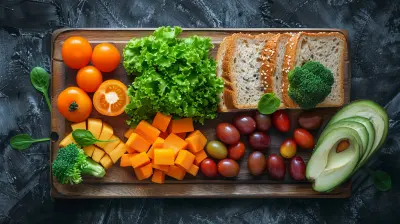The Truth About Zinc and Immunity
4 August 2025
Let’s talk about a not-so-secret—but often overlooked—superstar when it comes to your health: zinc. Yep, that tiny trace mineral that doesn’t usually get the spotlight like vitamin C or the trendy vitamin D. But don’t be fooled by its quiet nature—zinc packs a serious punch when it comes to supporting your immune system.
In this post, we're diving into the nitty-gritty of zinc and immunity. No fluff. Just the real deal in a fun, easy-to-digest way that'll have you looking at your multivitamin with new respect.
Why All the Buzz About Zinc?
You might be wondering, “Why should I care about zinc? Isn’t it just another supplement on the shelf?” Great question.Zinc is actually essential—and I don’t mean that in a trendy Instagram way. Your body literally can’t function properly without it. It’s involved in over 300 enzymatic reactions. Think of zinc like the behind-the-scenes tech crew making sure the onstage performance (a.k.a. your health) goes off without a hitch.
And when it comes to immunity? Zinc is the guy your immune system calls first when viruses and bacteria start causing trouble.
What Exactly Does Zinc Do for the Immune System?
Alright, let’s break it down. Zinc isn’t a magic wand (bummer, I know), but here’s what it does do:🧪 Supports White Blood Cell Function
White blood cells are like your body’s personal security guards. Zinc helps produce and activate these cells, so they can better detect and destroy invaders. Without enough zinc, these guys get a bit lazy and less effective.🛡️ Enhances Antioxidant Defense
Ever heard of oxidative stress? It’s like when your body gets overwhelmed by bad guys (free radicals) and starts taking damage. Zinc helps reduce this stress by supporting antioxidant enzymes.🚫 Limits Inflammation
While inflammation can be a useful signal your body uses to fight off intruders, chronic inflammation? Not so fun. Zinc helps keep that in check, so your immune response doesn’t go overboard.🤒 May Shorten the Common Cold
Yep, the rumors are true. If you start taking zinc at the first hint of a scratchy throat or sniffle, it might cut down the length and intensity of your cold. Some studies suggest zinc lozenges can reduce cold duration by up to 33%. That’s a win in our book!
Symptoms of Zinc Deficiency (And Why You Might Not Even Know)
You might be walking around low in zinc and not even realize it. That’s because a zinc deficiency can be sneaky.Common Signs of Low Zinc:
- Frequent colds or infections- Slow-healing wounds
- Loss of taste or smell
- Thinning hair
- Skin rashes
- Brain fog
Sound familiar? Don’t panic. It doesn’t definitely mean you’re low on zinc, but it's worth chatting with your doc if a few of those ring a bell.
Who’s Most at Risk for Zinc Deficiency?
Not everyone is equally at risk. Certain folks might need to keep a closer eye on their zinc intake, including:- Vegans and vegetarians: Sorry, plant pals. Zinc from plant sources isn’t absorbed as well as from meat.
- Older adults: As we age, zinc absorption can take a bit of a dive.
- People with digestive issues like Crohn’s disease or IBS.
- Pregnant and breastfeeding women: Baby-making and milk production use up more zinc.
- Alcohol drinkers: Excessive alcohol can interfere with zinc absorption and increase loss.
Best Sources of Zinc (Hint: It's Not Just Red Meat!)
Let’s talk food. The good news? You don’t have to rely on supplements alone. Zinc hides out in some pretty tasty places.Top Zinc-Rich Foods:
- Oysters 🦪: The MVP of zinc foods. Seriously, they blow all other sources out of the water.- Red meat: Beef and lamb are solid options.
- Pumpkin seeds: A plant-based powerhouse.
- Lentils and chickpeas: High in zinc, especially for vegetarians.
- Nuts and seeds: Cashews, almonds, and sunflower seeds.
- Whole grains: Quinoa, oats, and brown rice.
- Dairy: Cheese and milk add a bit of zinc to your day.
- Eggs: A breakfast win!
Pro Tip: To enhance zinc absorption from plant foods, soak and sprout legumes and grains. Phytates (natural compounds in plants) can block zinc’s entry into your system. Sprouting helps kick them to the curb.
Should You Take a Zinc Supplement?
Okay, so we’ve established zinc is crucial. But how do you know if you should pop a supplement?Well, if you eat a balanced diet and aren’t in any of the higher-risk groups, you might be getting enough from food. But if you’re on the fence or frequently get sick, a supplement could help bridge the gap.
Recommended Daily Zinc Intake:
| Group | Daily Requirement ||--------------------------|-------------------|
| Adult men | 11 mg |
| Adult women | 8 mg |
| Pregnant women | 11–12 mg |
| Breastfeeding women | 12–13 mg |
Choosing the Right Zinc Supplement
Walk into any supplement aisle, and your head might spin. Zinc gluconate? Zinc picolinate? Zinc citrate?Here’s a cheat sheet:
- Zinc Picolinate: Thought to have superior absorption.
- Zinc Citrate: Gentler on the stomach, good absorption.
- Zinc Gluconate: Common in cold remedies, decent absorption.
- Zinc Oxide: Less bioavailable—often used in sunscreens more than supplements.
And remember: more isn’t always better. High doses of zinc long-term can mess with your copper levels and lead to nausea. Yikes.
Stick to the recommended dose unless advised otherwise by your healthcare provider.
Can You Take Too Much Zinc?
Unfortunately, yes. While deficiency isn’t great, going overboard is equally not-so-great.Signs of Zinc Overload:
- Nausea or vomiting- Diarrhea
- Headaches
- Metallic taste in your mouth
Long-term mega-dosing can throw your nutrient balance out of whack. Zinc competes with copper and iron for absorption, which can lead to unintended deficiencies.
Bottom line? Moderation is the name of the game.
Zinc Myths Debunked
Let’s bust some myths, shall we?❌ “Zinc can completely prevent illnesses.”
Not exactly. It supports your immune system—and gives it a better shot at fighting off invaders—but it's not a magic shield.❌ “You should only take zinc when you’re sick.”
Nope! Consistent, daily intake is the real key. Think of zinc as building your immune savings account. You’ve got to keep adding to it regularly.❌ “You only get zinc from meat.”
Vegetarians, rejoice. While meat is a rich source, there are plenty of plant-based options (hello, pumpkin seeds 👋).Final Thoughts: Should You Care About Zinc?
100% yes. Zinc may not have the star power of some other nutrients, but it’s a foundational player in keeping your immune system on point.If you’re someone who:
- Always catches the office cold
- Takes forever to heal from a paper cut
- Or just wants to stay on top of your wellness game…
…then giving your zinc intake a little more attention might be exactly what you need.
You don’t have to revamp your life—just be zinc-aware. Whether it’s tossing a handful of pumpkin seeds into your salad, adding more beans to your chili, or grabbing a supplement (on your doctor’s advice), small tweaks can lead to big wins.
So, go ahead—give zinc the credit it deserves. Your immune system will thank you (probably by helping you avoid your 6th cold this year).
all images in this post were generated using AI tools
Category:
Immune SystemAuthor:

Laurie Barlow
Discussion
rate this article
1 comments
Mallory Newton
Great insights! Zinc's role in immunity is often underestimated; thanks for clarifying its importance!
August 28, 2025 at 4:15 PM

Laurie Barlow
Thank you! I’m glad you found it insightful—zinc truly is vital for a robust immune system!


